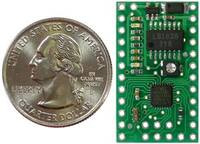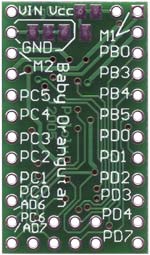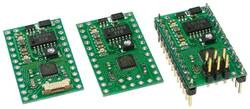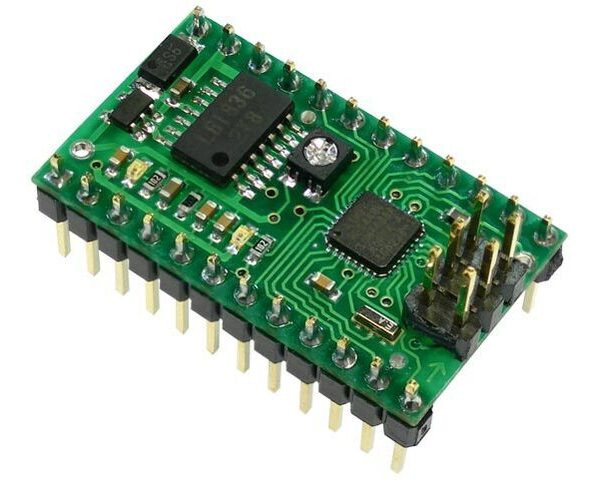Baby Orangutan robot controller mega48
The Baby Orangutan is Pololu’s smallest robot controller: it packs an AVR microcontroller and two motor drivers into a tiny 24-pin DIP package, making it perfect for everything from micro sumos to auxiliary control on larger robots. This version includes Atmel’s mega48 microcontroller with 4 KB of program memory and 512 bytes of RAM.
| Description | Specs (2) | Pictures (3) | Resources (11) | FAQs (0) | On the blog (0) | Distributors (0) |
|---|
This product has been replaced by the new Baby Orangutan B-328 and is now discontinued.
 |
Overview
The Baby Orangutan is a complete control solution for small robots that is even smaller than the original Orangutan robot controller. By removing the bulkier components such as the LCD and switches, Pololu engineers have shrunk the most essential features into a 1.2" x 0.7" dual in-line pin (DIP) package. Unlike similarly-sized microcontroller boards from other manufacturers, the Baby Orangutan features two independent motor drivers for direct control of two DC motors. Two on-board indicator LEDs, a trimmer potentiometer, and a 20 MHz resonator round out the basic hardware features of the Baby Orangutan.
 |
The removal of the larger Orangutan components also allows for a significantly improved manufacturing process that allows Pololu to offer the Baby Orangutan at a very affordable price. Because the Orangutans are based on Atmel’s high-performance AVR microcontrollers, the Orangutans deliver significantly higher performance than other similar controller boards. The availability of free development software, such as Atmel’s AVR Studio IDE and the WinAVR GCC C/C++ compiler, and low-cost programmers, such as the Orangutan USB programmer, make the Baby Orangutan a truly outstanding value.
For those not necessarily interested in robotics, the Baby Orangutan is also a great introduction to the AVR microcontrollers because of its size and price. All you need to get started is a low-cost programmer and a power source. You can fit a substantial design even on a small breadboard since you won’t need the space for basic components such as the voltage regulator and resonator.
The Baby Orangutan is available with either the ATmega48 or ATmega168 AVR microcontroller. The mega48 and mega168 differ only in memory sizes, boot loader support, and interrupt vector sizes.
ATmega48 and ATmega168 Comparison
 |
Pololu Baby Orangutans with FFC programmer connector, with no pins soldered in, and with all pins soldered in. |
|---|
| mega48 | mega168 | |
|---|---|---|
| Flash | 4K Bytes | 16K Bytes |
| EEPROM | 256 Bytes | 512 Bytes |
| RAM | 512 Bytes | 1024 Bytes |
| Interrupt Vector Size | 1 instruction word/vector | 2 instruction words/vector |
| Boot Loader Section | none | 128, 256, 512, or 1024 words |
The compact module can be used as a DIP component on breadboards or prototyping boards, or the pin-less versions can be used for space-constrained installations in miniature robots. The header pins are included in the package, but are not soldered in. Power pins, one of the motor outputs, and several I/O lines are all accessible from one side to enable use of the Baby Orangutan as a single in-line pin (SIP) package for applications that do not require all of the I/O lines. The small size and low cost of the Baby Orangutan makes it a perfect option for primary control of small robots or for auxiliary control on larger robots.
The Baby Orangutan input voltage is 5-10 V, making it well-suited for use with small DC motors and 5- to 8-cell NiCd or NiMH battery packs. The motor driver can supply up to a maximum of 1 A per motor channel, subject to power dissipation requirements.
Specifications & On-Board Hardware
- overall unit dimensions: 1.2" x 0.7"
- input voltage: 5-10 V
- 2 bidirectional motor ports connected to LB1836M motor driver (1 A maximum per channel)
- programmable 20 MHz Atmel ATmega48 AVR microcontroller (4 kB flash, 512 bytes SRAM, 256 bytes EEPROM)
- 18 user I/O lines, 16 of which can be used for digital I/O and 8 of which can be used as analog input channels
- 1 user LED
- user potentiometer tied to ADC7
- 20 MHz external resonator
People often buy this product together with:
 |
Tamiya 70144 Ball Caster Kit (2 casters) |
 |
Tamiya 70168 Double Gearbox Kit |











